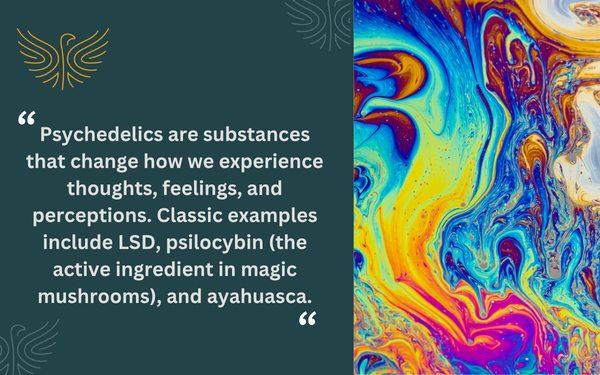Addiction affects millions of Americans, yet fewer than 10% receive treatment. And even among those who get help, relapse remains high, and many also drop out of their rehab programs before completion. But this is where non-traditional approaches are being explored, such as psychedelics.
Once pushed to the fringes by decades of prohibition, substances such as psilocybin, MDMA, and ketamine are now reentering the spotlight through medical research. But can these once-controversial compounds truly offer hope for treating addiction? In this article, we take a closer look.
_______________________________________________________
What Are Psychedelics?
Psychedelics are substances that change how we experience thoughts, feelings, and perceptions1. Classic examples include LSD, psilocybin (the active ingredient in magic mushrooms), and ayahuasca. These work by stimulating certain serotonin receptors in the brain. Others, like ketamine, affect different systems, blocking NMDA receptors and influencing glutamate, a key brain chemical involved in learning and memory2.

These substances can simultaneously impact multiple brain networks. They may boost neuroplasticity—your brain’s ability to form new connections3—and temporarily quiet the default mode network (DMN), which is linked to self-critical thoughts and overthinking. This “reset” effect could help people break out of rigid patterns and open the door to healing.
Importantly, psychedelics used in addiction treatment aren’t taken recreationally. They’re given in a clinical setting by trained professionals. Treatment includes preparation before the session, support during the experience, and integration afterward to help make sense of what comes up and apply it to real life.
_______________________________________________________
Why Psychedelics Are Being Considered for Addiction
While traditional addiction treatments help many people, they also have their limits. Medications approved by the FDA often have only modest effects, and behavioral therapies can struggle with long-term success due to high relapse rates. The main issue is often that many of these approaches focus on managing symptoms instead of the root cause.
Psychedelics, on the other hand, rather than simply blocking cravings or replacing one substance with another, may help uncover and heal deeper issues like trauma, depression, or a sense of disconnection4. These experiences can lead to powerful shifts in how people see themselves and their addiction.
What the Research Says
The following sections take a closer look at the current research into psychedelics and addiction treatment.
Psilocybin
Psilocybin—the active compound in magic mushrooms—has shown significant promise in treating addiction, particularly alcohol and tobacco use5. Researchers at Johns Hopkins University have led the way, including a study where psilocybin-assisted therapy helped longtime smokers quit, with success rates far higher than traditional treatments.
A 2022 randomized controlled trial found that psilocybin, when combined with psychotherapy, reduced heavy drinking by 83% compared to placebo. These effects persisted for months after treatment.
Ketamine
Ketamine is already FDA-approved for treatment-resistant depression (as esketamine nasal spray)6. Its rapid effects and unique action on the brain make it a compelling candidate for addiction treatment as well.
Unlike classic psychedelics, ketamine targets glutamate pathways and promotes neuroplasticity—the brain’s ability to rewire itself. Studies show it can reduce cravings and substance use, especially for alcohol and opioids.
Ayahuasca & LSD
While less extensively studied for addiction specifically, both ayahuasca and LSD show promise in preliminary research7. Ayahuasca, a plant-based brew containing DMT, has been used in traditional healing contexts for centuries and appears to facilitate long-term self-reflection and behavioral change.
LSD, the substance that sparked the original wave of psychedelic research in the 1950s and 60s, demonstrated efficacy in early addiction studies before prohibition halted research. Recent renewed interest suggests it may aid in treating various substance use disorders, though more research is needed to establish safety and efficacy protocols.
_______________________________________________________
A Word of Caution…
Psychedelics are emphatically not magic pills that cure addiction through pharmacology alone. The therapeutic model being researched involves extensive preparation, professional guidance during dosing sessions, and structured integration work afterward.
Set and setting—a person’s mindset and physical environment—also heavily influence psychedelic experiences and outcomes. Clinical trials take place in carefully controlled environments with trained therapists who provide psychological support throughout the process. Integration sessions following psychedelic experiences are further considered critical for translating insights into lasting behavioral change.
Despite promising research, significant challenges remain. Most psychedelics retain Schedule I status under federal law, classified as having no accepted medical use and a high potential for abuse8. This classification creates barriers to research and limits access to potentially beneficial treatments.
Access to qualified clinical trials or treatment centers also remains extremely limited. While some cities and states have decriminalized certain psychedelics, this doesn’t provide legal access to clinical treatment. Patients seeking psychedelic therapy often must enroll in research studies or travel to jurisdictions where these treatments are available.
Additionally, safety concerns include the potential for “bad trips,” psychological distress, or exacerbation of underlying mental health conditions. Long-term studies examining safety and efficacy are still necessary, and standardized treatment protocols are still under development.
Yet, when choosing a treatment center to help tackle your addiction, it’s always important to do your research. At Freedom Recovery Centers (FRC), we strive to offer treatment programs suited to each individual, ensuring you get the care you need and deserve. For more information, call us at 804-635-3746 or fill out our online form. Our team is ready to help.
.svg)






.svg)

.svg)



.svg)
